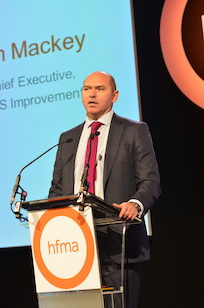News / Mackey calls on trusts to address variation (HFMA 2016)
He said there was a discussion in the finance community about the funding of health and social care. ‘We shouldn't be distracted by this – that’s for the politicians. But there’s no doubt we could do more in every organisation and system.  ’
’
He called for greater positivity. ‘As a finance profession we are hard-wired to be cautious, prudent, to be borderline negative – some of you are too negative – but we need balance in the discussion. We should take time to reflect on the fantastic progress we have made.’
However, he insisted that accountants should not sign up to any figures with which they were uncomfortable. ‘If anybody tells you to report an answer you don't think is right and there is no resolution to that, come to the senior leaders. If you are feeling compromised and don't feel you are getting anywhere, I am happy to take a call from you personally.’
He said the NHS in England is on course to reduce agency staff spending by almost £1bn by the end of this financial year. ‘This is fantastic, but we have hardly touched medical agency costs. The reduction has been largely borne by nursing.
‘We have made major progress, but there is still massive excess cost in the medical locum market.’
Though there were potential legal issues, he would intervene in the market if it would not correct itself. ‘There may need to be a market intervention, where we say, “This is the rate if you are an acute care physician or A&E consultant working on a Friday night." It is a weakness how we have allowed ourselves to get played off each other. We need to hold this together and not blink. If it needs market intervention, I will do it.’
There was still more to be done on agency staff in general. ‘October was the lowest level of agency spend since we started measuring it. But we still have a long way to go to get back to the level of five years ago,’ he said.
Locum spending was highest in hot specialties, such as A&E, acute medicine and radiology, but also in cold, elective services.
He said the conversation had begun in some STPs about whether services that relied almost wholly on temporary staff should continue or whether there were viable alternative providers of those services.
He described the STP process as ‘a safe place to start thinking the unthinkable. While he ruled nothing out on the availability of capital, he said that there was a misconception early in the STP process that it was a bidding round for capital.
‘We need to have a strong case and we haven’t got a strong enough case yet to go into bat. We have to strengthen our case, looking at things like return on investment – we can’t go to the Treasury if we can’t demonstrate that the money will come back in 10 years, say.’
While the narrative was to shift care out of hospitals, the NHS could not ask to build more hospitals. And, in the wider economic context, the price of steel, used in buildings, had risen 20% in the wake of the EU referendum.
A sustainability and transformation fund incentive fund, made up of the unspent STF allocation, would be announced soon. This would hand funding to those that could go further than agreed plans to improve performance, he said.
Control totals for next year were designed to get the provider sector back into financial balance overall. If this was achieved, providers would be in a position the year after to get back to 2013/14 levels of financial performance.
‘Trusts in deficit will be in a minority again and we will be in a position where we can start talking about earned autonomy again.’
Related content
We are excited to bring you a fun packed Eastern Branch Conference in 2025 over three days.
This event is for those that will benefit from an overview of costing in the NHS or those new to costing and will cover why we cost and the processes.